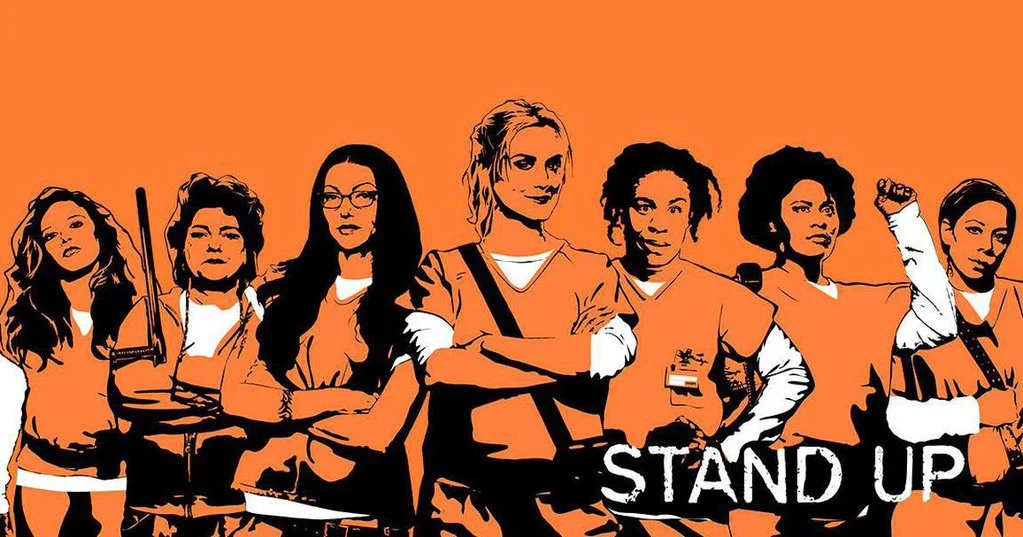Orange Is the New Black: Orange Black or Bleak: S5 E5 “Sing it, White Effie” (Netflix)
Orange, Black, or Bleak S5 E5: “Sing it, White Effie”
As a formerly incarcerated person, I have decided to do a deep-dive into the Netflix show Orange Is The New Black to help explain some of the things that folks watching the show without a felony background might not catch.
Funny thing, I check my Google Analytics and a TON of people spend a TON of time reading these posts, I cannot tell you how flattering that is, thank you from the bottom of my heart! So, the writing is tolerable, but the comment questions are clearly terrible.
Seriously, thanks for all of the traffic and for taking the time!
By the way, this is a real gut punch of an episode on many levels.
If you have not watched OITNB before *Spoiler Alert*
5 Things About Season 5 Episode 5 "Sing It, White Effie"
OITNB S5 E5 “Sing it, White Effie” is about:
* (More of) the backstory of Janae (Vicky Jeudy). Earlier in the series, we learned she was a successful athlete who got caught up with a guy and ended up left holding the bag after an armed robbery). Now we learn that when she was younger, she was an accelerated student in a high school in a poor neighborhood. Her teacher sets her up to visit a private school (in order to let her see possibilities that could open up for her if she continues to work hard). The visit does not go well.
* The Governor and the CEO of MCC (Management and Corrections Corporation) discuss the appropriate response to the Riot (both decide to stand down).
* Piper (Taylor Schilling) and Alex (Laura Prepon) are trying to figure out how to make it work despite all of their differences and complicated history. Also, Piper is still trying to get her head around Alex’s desire to admit her guilt and how Alex seems to have become a cult leader for all of the people choosing to live out on the yard (instead of inside the unit).
* Gloria (Selenis Leyva) is having problems with taking care of Daya (Dascha Polanco) at the same time she is having a hard time being honest with Daya’s mother Aleida (Elizabeth Rodriguez) about how the riot started. At the same time, Aleida is having problems finding work after release.
* The Nazi’s have made Judy King (Blair Brown) a “slave but they decide to “sell” her. Sankey says “If you want her you have to buy her, like an American.” Yes, they have an actual auction in the cafeteria (sigh). Judy gets sold to Cindy (Adrienne C. Moore) for a “baby calendar.” Taystee (Danielle Brooks) and her crew decide to use Judy to get their message out to the press. But Taystee, after listening to Janae, takes things into her own hands delivers the message herself and release Judy King.
* The continuing adventures of the meth-heads vs. Doggett (Taryn Manning) and of Doggett and CO Donuts (James McMenamin) which is still really uncomfortable to watch. Ultimately, Doggett takes the gun from Angie then gives it to Donuts who accidentally shoots Leanne’s finger off. Donuts takes the gun and leaves the prison. Big Boo (Lea DeLaria) tries to warn Doggett not to help Donuts, but Doggett doesn’t listen.
“Sing it, white Effie” is a reference to young Janae (Journee Brown) watching young white girls dressed up like The Supremes singing songs from the musical Dreamgirls.
5. “So Many of These Women are Mentally Ill”
Aleida sees a "so-called" expert talking about the riot on television. The expert is arguing that the women of Litchfield are unredeemable because many of them are “mentally ill” and that the others are mostly gang members with no interest in doing good in the world or in being rehabilitated.
Okay, lots of stuff to unpack here.
So, this will probably sound crazy, but I HATE the term rehabilitation.
First, there is no connection between teaching people how to clean toilets and “rehabilitating” them. The vast majority of jobs in prison don’t teach anyone anything that they could not learn in five to ten minutes on the outside and have absolutely NOTHING to do with inspiring me to change my (or any other prisoner’s) feelings toward crime.
Second, the jobs almost always limited to janitorial or food service work and they have nothing to do with providing people an opportunity to succeed on the outside. Yes, it is good to get a GED for instance, but a GED is unlikely to convince someone to change their life by providing them with a low-level of education and some skills in using a mop (or to convince an employer to hire them).
Third, it is an incredibly paternalistic term. It is usually used to induce people to reach down deep and find a place in their heart to throw scraps at former prisoners. I committed no crime against most of the people who insist upon rehabilitating me (and/or giving me a “second chance”). I believe that I paid my debt when I served my sentences and if I am qualified for your job you should hire me because I am a qualified and not because I have been "rehabilitated." Want me to reconnect successfully to your community, treat me like I am welcome.
In other words, I don't want a second chance, I paid my debt. I want a chance if and because I am qualified.
This doesn't mean that I am not sorry for what I did it or that I haven't made amends or paid a price, it means I don't owe you a never ending apology for what I did or additional thanks for giving me a chance.
A crime is something I did, it is not who I am.
I am not a game you can play, a way for you to earn credits in heaven, or your rehabilitation project. I am a human being, a citizen of the United States of America, and I am not your prisoner or your good deed.
Now, if you want to train people to have and choose alternatives to crime on the outside, talk to them and find out where their real potential lies. Take that information and use it to create meaningful options to help them learn the skills necessary for them to get a job, In other words, provide the skills necessary for them to actually believe a different life is possible and then connect them to opportunities to utilize those skills.
Just last week Jeff Bezos of Amazon asked for crowdsourced ideas for ways to use his money productively. I suggested that he could make a massive difference in the world by helping to create a "model in-reach program" in prison that starts directly after sentencing and extends all the way until each prisoner gets a job in his or her chosen field. Help me make this happen, write or tweet him (@JeffBezos) and show support for a model in-reach program for prisons.
Ok, next, yes there are a TON of mentally ill people in prison. In fact, jails and prisons are the largest “treatment” system for mentally ill people in virtually every state. Unfortunately, not much treatment happens and when it does, it is usually based on discredited models. This is also true of addiction treatment in prison (in case you were wondering). There are some best practices being developed but their spread is way too slow for my taste.
Anyway, the idea that somehow being mentally ill disqualifies you for help or redemption is an unfortunate cultural meme. Way too often the mentally ill are judged dangerous because a very small percentage of mentally ill people commit horrific acts.
I have said this before here, and I will likely say it again, NOTHING in my time in prison made me more ashamed to be an American than how we treat the mentally ill in jails and prisons.
4. “Getting Mad Job Offers”
Aleida is having real problems getting jobs because all she knows how to do is paint nails and nobody seems to want to hire her at nail shops. Despite this, she tells Gloria that she is “getting mad job offers.”
Just to finish out the thoughts above, most people (like Aleida) come out of prison without any marketable skills or the ability to overcome the prejudice against hiring people with a record. It is no surprise many people turn back to crime (which can be lucrative).
Even people who come out with skills have a hard time getting jobs (I couldn’t get a job, for instance, waiting tables when I was released).
There are generally three major approaches to trying to fix this currently:
* Ban The Box legislation - which attempts to create the space for an interviewer to get to know an applicant prior to finding out about a criminal record.
* Clean Slate legislation (Expungement) - which attempts to allow people with felonies to, after a period of time, erase the traces of their criminal conviction from official and online databases.
* Liability Shield legislation - Companies that hire formerly incarcerated people can leave themselves open to liability lawsuits. Liability shield legislation can create protection against blanket liability.
And let me add a fourth approach which I have heard about lately, some people are working around creating social engagement between potential employers and formerly incarcerated people under the assumption that getting to know each other under social circumstances can create more lasting relationships and make it easier for employers to see past criminal records.
There is not much literature on this yet, but I have heard of it being a very successful technique from people studying it.
Again, all of this is kind of irrelevant if the only training people get in prison is janitorial or food service and no attempt at all is made to harness and develop people’s actual talents. This is why an in-reach program that starts at the gate and ends with employment could be such a game changer (please Tweet Jeff Bezos - that dude basically owns the world and could afford to make a real difference, it sounds crazy, but it just might work).
Anyway, the worst thing you can do for public safety is to make formerly incarcerated people economically and socially insecure. Let's try something different, help me build support for a new approach.
3. “Don’t Let That White Woman Karaoke Our Story”
Okay, now to the truly heartbreaking parts of “Sing it, white Effie.” Janae makes the above comment in opposition to Taystee letting Judy King make the speech about their reasons for the riot to the press. But the reason she says it is tied up in her visiting the private school as a kid and watching some white girls dressed up like the Supremes singing songs from the musical Dreamgirls.
Brutal.
This is an even tougher episode because it happens in the context of yet another white police officer getting off for shooting a black man in cold blood.
These are systemic problems we are facing folks. Black culture can get appropriated by people who “have so much culture that they don’t know when they are stealing ours” but black people (and other people of color) cannot feel safe driving (Philando Castille), walking down the street selling loose cigarettes (Eric Garner), and black kids can’t even feel safe playing with toy guns in playgrounds (Tamir Rice).
Black folks can play football, but God forbid they refuse to play the patriotism game the way white folks want it played (Colin Kaepernick). Black folks can be superstars in basketball, but God forbid hey stand up and speak out on social issues (Lebron James).
And all the while, white people lament how unfair it all is (yes, I am white).
Anyway, I don’t want to get off too much on a tangent here but I would suggest checking out Spike Lee’s very underrated movie (about appropriation) Bamboozled. Not an easy watch, but it explains how utterly dehumanizing and brutal it feels. It is most certainly not felt as an homage, especially in an unequal society rife with racism.
Maybe the best moment in all five seasons of Orange Is the New Black for me is when Taystee stands in front of the gathered press outside Litchfield and says: “Our fight is with a system that don’t give a damn about poor people or brown people, or poor brown people.”
Amen.
2. “This Is America Lady, Slavery Ain’t Legal Here”
Aleida says this to the woman who tries to use the leverage of a possible job to extort her.
However, anyone who has read the Constitution or seen the excellent Documentary “13th” knows this isn’t true. In case you missed it here is the text of the 13th Amendment of the Constitution:
Section 1. Neither slavery nor involuntary servitude, except as a punishment for crime whereof the party shall have been duly convicted, shall exist within the United States, or any place subject to their jurisdiction.
Section 2. Congress shall have power to enforce this article by appropriate legislation.
So, technically, slavery is actually legal in America if used as punishment for a crime (this is the so-called “13th Exception”).
Slavery IS here.
This is also why, while imprisoned the CO’s often argue that you are only a number or say that you are “State Property” because technically, you are actually a slave to the state.
Also, as much as I love the Constitution conceptually, the 13th exception is totally fucked.
This also might explain why the very next scene is when we see that Judy King is a “slave” to the Nazi’s (sigh).
I can’t tell you how distasteful I found both of these scenes. I get that much of this season is about how abused become abusers when power is changed, but it is just fucked up to watch prisoners bodies being used in this manner.
It is bad enough we all have been used by the State, abused by the State, treated like dogs by the State (I was actually kept in what appeared to be a human kennel during transportation at one point in my incarceration). But to then make comedy out of prisoner's treating prisoner's like chattel seems more than excessive and offensive.
Yes, there are some really shitty racists in prison, and people who do some terrible things, but that doesn’t give the writers of some television show to use even fictional prisoner bodies as props for acting out a slave auction. Especially when part of the whole point of the episode is that appropriation is wrong.
I mean for God’s sakes, at several points they have Judy King on a leash.
That is not okay.
If the point is to expose how prisoners are treated as sub-humans and not as human beings okay (painful to watch and PTSD inducing, but understandable). This was something that felt very exploitative and unnecessary.
I don’t know this for sure, but I don’t think Jenji Kohan has a criminal record, why is it any more okay for her to use prisoner’s bodies to play out a slave auction than it was for Judy King to tell Taystee and Janae’s story or for white girls (dressed Black) to sing Dreamgirls?
I love the show, I love Jenji, but that is just not cool IMHO.
1. Orange Is the New Black
Speaking of appropriation, I want to clear something up and apologize for a mistaken assumption on my part.
I want to talk about why the show is called Orange Is the New Black.
I have actually talked to several people of color who were turned off from the show or the book because they find the title offensive. As in they wonder why Orange Is the New Black when Black is still pretty much Black (see above).
Luckily, and I totally forgot this part of the book until today, the title is actually a reference to friends and fashion. When the real Piper Kerman was incarcerated, her friends sent her a picture of them all dressed in orange with the caption “Orange Is the New Black” under the picture.
In other words, Piper should feel better about wearing Orange because it “Is the New Black.”
I feel dumb because I tried to ask Piper Kerman to clarify (it has been like a million years since I read the book).
Anyway, glad I eventually had my memory jogged on that by a friend.
Now, all that said, definitely one of the better episodes of Season 5 (aside from Donuts and Doggett which still really creeps me out).
Unlocking The Gates
I am a member of a Criminal Justice Reform organization called Nation Outside (The Voice of the Formerly Incarcerated) but I am not speaking for Nation Outside in any official capacity.
If you are interested in criminal justice reform or are formerly incarcerated yourself, please consider joining the fight (if you are a Michigan resident - you can sign up by clicking on the hyperlink above).
Today's Comment Question is:
“Who is right about Alex disclosing her crime, Alex of Piper?"
Leave a comment, let people know. Or, if you have questions, I respond to 100% of my comments!
Today's book is John Pfaff’s book "Locked In."













My recap of “Here’s Where We Get off” Orange Is the New Black Season 7 Episode 13 (from the perspective of a formerly incarcerated person). And now we come to the end of a 91 episode journey together.